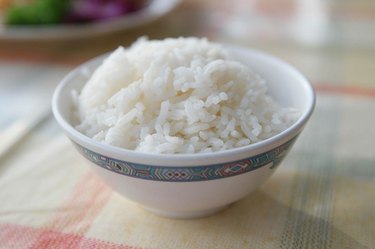
Protein is the nutrient that first comes to mind when you think of the bodybuilding diet; however, carbs are equally important for bodybuilders. Here's what you need to know about healthfully including rice in your diet and the benefits of brown rice versus white rice for bodybuilding.
A Source of Energy
Video of the Day
Carbohydrates provide the energy that powers your workouts. According to the Academy of Nutrition and Dietetics, the carbs you eat are partially converted to glycogen, which is then stored in your muscles and used to fuel your activity.
Video of the Day
All the various types of rice are good sources of carbs; however, the exact number of carbs varies slightly across varieties and brands. Brown rice, for example, has 22.94 grams of carbs per 100 grams, white rice has 33.88 grams of carbs per 100 grams and jasmine rice has 37.72 grams of carbs per 100 grams.
Brown Rice Vs. White Rice for Bodybuilding
Rice is a great addition to the bodybuilding diet, especially if you're in the bulking phase and trying to gain mass. You've probably heard a lot of different opinions about brown rice versus white rice for bodybuilding and which type you should be eating. Even though white rice usually gets a pretty bad rap, there are actually some benefits of white rice for bodybuilders.
The key difference between brown rice and white rice is that brown rice is whole-grain rice whereas white rice is refined rice, according to the Harvard T.H. Chan School of Public Health. Like all grains, rice has three edible components, namely the bran, the germ and the endosperm. The inedible outer hull of the grain is removed during the refining process.
Brown rice is a whole grain because the bran and germ are left intact. The bran is rich in fiber and the germ contains most of the nutrition. These layers give brown rice its nuttier taste and chewier texture and result in a slightly longer cooking time.
White rice is rice that has been polished; the polishing process removes the bran and germ so that only the white, starchy endosperm remains. The rice has essentially been stripped of the majority of its fiber and naturally occurring nutrients like minerals, B vitamins and phytochemicals, and what remains is almost pure sugar. Enriched varieties of white rice have a fraction of the iron and B vitamins added back.
Despite its lack of nutrition, there are some benefits of white rice when it comes to bodybuilding. White rice makes for a good post-workout meal since your body digests it faster. According to the International Society of Sports Nutrition, your body needs to rapidly replenish its glycogen stores after a high-intensity workout, so you should opt for carbs that your body can digest quickly.
The benefits of white rice are limited to post-workout meals. Brown rice is a good option for the rest of your meals because along with carbs, it delivers fiber and nutrition too. Thanks to the fiber content, brown rice takes longer to digest and provides energy over a longer period of time.
Including Rice in Your Diet
Rice is a cheap and easily available source of carbs that's easy to cook. A versatile food, it can be served as an accompaniment to most dishes and goes especially well with meals that consist of lean protein and plenty of vegetables. For example, vegetables, chicken and rice are a bodybuilding staple.
If you typically eat five or six meals a day, rice is a convenient option since you can cook large quantities at a time and store it in the fridge, adding it to your meals when you're ready to eat. If you're into meal prep, you can prepare a few portions of veggies, chicken and rice for a healthy bodybuilding meal.
Steamed rice or boiled rice is much healthier than fried rice, since it contains less oil and salt. You can season your rice with herbs, spices or vegetables, to give it flavor and nutrition. Skip ready-made rice varieties since they tend to have added preservatives and salt.
- Academy of Nutrition and Dietetics: “4 Keys to Strength Building and Muscle Mass”
- Harvard T.H. Chan School of Public Health: “Rice”
- Harvard Medical School: “A Good Guide To Good Carbs: The Glycemic Index”
- US National Library of Medicine: “International Society of Sports Nutrition Position Stand: Nutrient Timing”
Was this article helpful?
150 Characters Max
0/150
Thank you for sharing!
Thank you for your feedback!